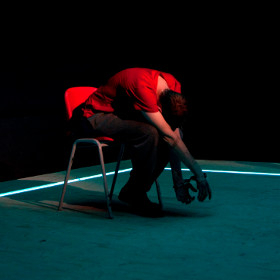Michael Coveney: More on Secret Theatre and Donmar buried treasures

There's a healthy schism in current critical thinking about Sean Holmes' Secret Theatre season inside the re-building site of the Lyric, Hammersmith. The online bunch love it, the print critics are not so sure. A median scepticism, as in all things, is the best position to occupy, I reckon, though last night's Show 3 went a long way to winning me round completely.
It was as though the secret, illicit side of the enterprise – with the audience gathering and jostling in the Italian coffee bar next door like the samizdat bohemian crowd I mingled with during the Prague clampdown before the Velvet Revolution – has infiltrated and informed the production values and performance temperature, too.
First of all there's the geographical excitement of going you know not quite where in the building. Then the realisation that this is not a re-visited classic but a brand new play, and it's going to go places even an "announced" new play might not dare go on the subject of capital punishment, for instance, or the validation of an alleged rape, or the integrity of the prison authorities, or just the simple matter of making jokes about physical disability and medical blunders.
You feel that this season is as much about Holmes' and his team taking the opportunity to renew their own appetite for theatre as it is for the audience. There's a similar process in motion, one hopes, though no signs of it yet, at the National and the RSC, where Rufus Norris has 18 months to ponder his programme and Gregory Doran embarks scarily on the entire Shakespearean canon – having been beaten spectacularly to that task by Dominic Dromgoole at the Globe last year.
It was a pleasure to meet the young American dramatist and director Eve Leigh at the Lyric last night, a face of the future, perhaps, with some impressive credits already under her belt and, I notice, an attachment two years ago to the Young Writers Programme at the Royal Court. And we all know where that programme leads: Polly Stenham and Bola Agbaje are just the start of it.
The Donmar Warehouse, too, is revving up to occupy its new education and and rehearsal space in the nearby Dryden Street warehouse, and has launched a "Tomorrow Project" involving schools around the London boroughs, part of a research programme leading to a professionally performed new play on the Donmar stage.
Meanwhile, the schools are inventing their own plays in workshops along such pre-agreed general topics as education, money, sport, and so on. Four of the schools – all from their respective sixth forms, some of them drama students – came into the Donmar on Tuesday lunchtime and performed their work, and highly impressive and enjoyable it was, too.
The occasion was doubly moving for two reasons: it fell on the 50th anniversary, to the very day, of the opening of the National Theatre; indeed it fell almost at the very moment when the Queen, whose mother laid the foundation stone of the NT in 1951, was visiting the backstage area on the South Bank and watching Clive Rowe lead a rehearsal of "Sit Down You're Rocking the Boat" from Guys and Dolls (part of the gala programme on 2 November).
And secondly, here was a programme of plays about the future of education being performed on the set of the current Donmar hit, Arnold Wesker’s Roots, a modern classic of a young girl finding her voice “under the influence” of argument and music in the new post-war, so-called meritocratic society at the start of the 1960s.
One school presented a sort of cadet version of Oliver Stone’s Platoon movie, an all-male cadre in white t-shirts and fatigues going through some impressive drill routines with shafts of conflict, doubt and inter-action; another, a well-staged litany of job-searching and dreaming at school. Then Emma Thompson's alma mater, Camden School for Girls, dressed in pyjamas and furry animal costumes, gave a montage of mini-monologues, overcoming individual alienation with a common, shared love of pop and dub-step; I spotted at least five new Emmas in their number.
The overall theme was a communal reaction in education against solo endeavour and fragmentation in the computer age. Old-fashioned values rule, OK; “onesies” don’t necessarily have to mean you’re alone. There is such a thing as society, pace Mrs Thatcher. And the fourth school topped this off with a disturbing, fervent futurist anti-drugs piece; the authorities were encouraging medically “enhanced” performance and the children rose up in protest.
I attend these educational projects in my capacity as drama adviser to the John Lyon's Charity, which funds some of them, and it's always an eye-opener to me to realise how much this "unseen," mostly un-reported work with schools and colleges feeds into the ethos of the main programme; at the Donmar, this as true for Josie Rourke as it was for Michael Grandage.
And the Lyric, Hammersmith, too, has always had a vibrant "outreach" and educational policy. For the moment, though, that research and basic experimental mentality is flat-out centre stage in the Secret Theatre season, albeit with professional actors and writers at its core. Maybe that's what's needed in our theatre more generally: a resolution that the future is now, not tomorrow.










